Menu
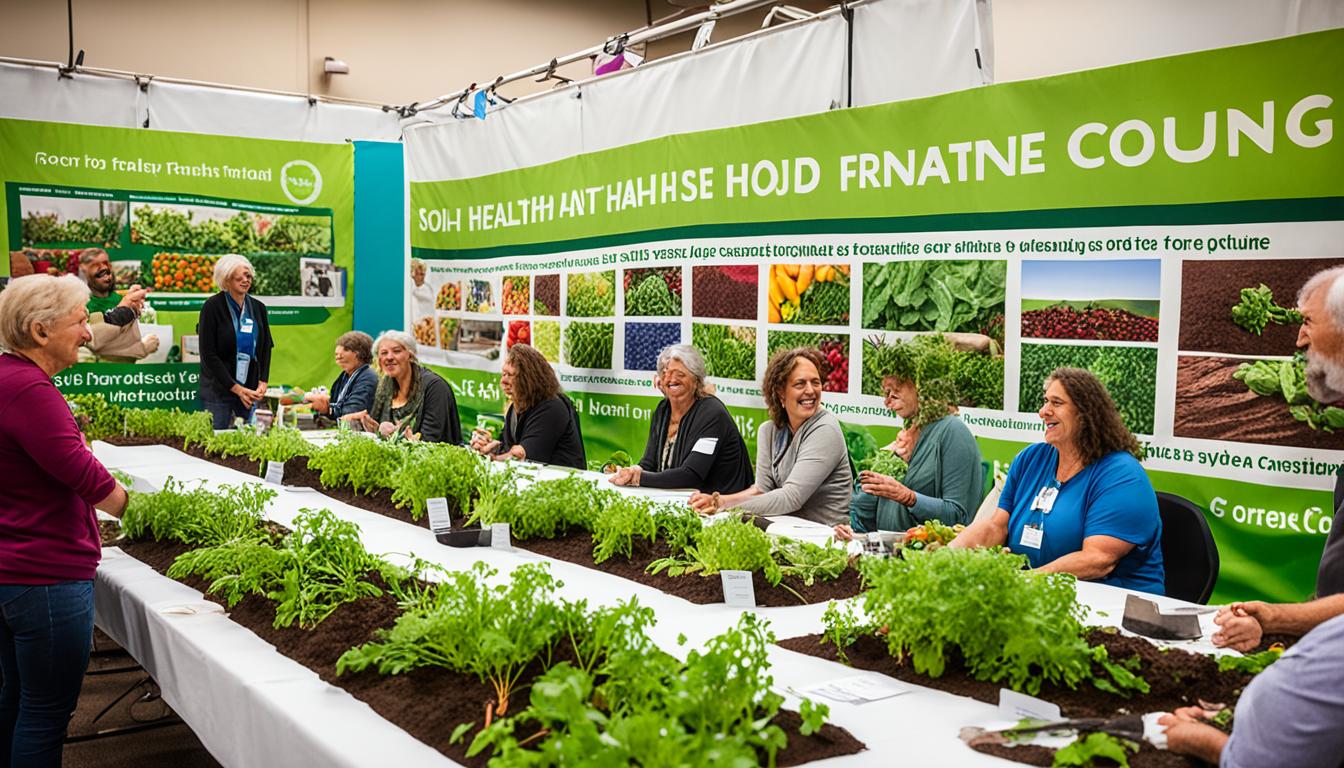
Since 1980, the American Farmland Trust has safeguarded over 7.8 million acres. This highlights the vital role soil health plays in sustainable farming. Their Advanced Soil Health Training program aims to train people from various farming backgrounds. It teaches them how to be Soil Health Advisors and encourages climate-friendly farming.
The workshops offer the chance to learn from the best in the field. Attendees discover regenerative agriculture’s principles to enhance soil health and profits. This includes access to valuable materials, webinars, and monthly global interactions with agri pros. The program is not just about learning; it’s also about making your farming business more profitable and resilient.
Soil health workshops are great for farmers to learn more about soil in farming. They mix class time with hands-on work. This helps people who grow different crops.
The workshops last for 12-18 months, with sessions in many areas. You can sign up in spring 2024. The classes teach about soil health and how to make farming better. You also learn to talk to other farmers well.
Those picked get help with travel costs. If you share how you use what you learn, you get more money. After the workshops, you can advise others on soil health and maybe get paid for it.
Soil health is key for our food. These workshops will be taught by experts in good farming. They will share ideas that save water and improve soil with new crops.
After the workshops, you will really understand why soil health matters. And you will know how to farm in a way that keeps the soil healthy.
| Region | Training Period | Application Opens | Stipend ($) |
|---|---|---|---|
| Midwest | 2024-2025 | Spring 2024 | 4,000 |
| Southeast | 2024-2025 | Spring 2024 | 4,000 |
| Mid-Atlantic | 2024-2025 | Spring 2024 | 4,000 |
| New York | 2024-2025 | Spring 2024 | 4,000 |
| New England | 2024-2025 | Spring 2024 | 4,000 |
Workshops focus on making soil healthier through regenerative farming. They teach farming principles that boost soil health. Participants learn about soil function, nutrient systems, and soil life. This knowledge helps make the land more fertile and productive.
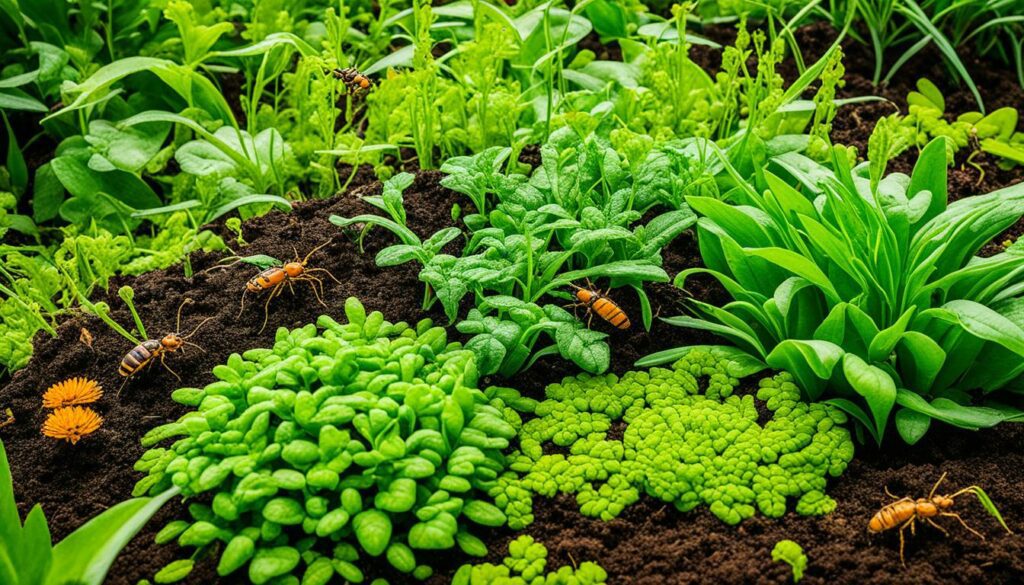
The workshops highlight important regenerative farming methods. Some key practices are:
These techniques are crucial for improving soil fertility. Experts, like Dr. Ted Radovich and Joe Williams, share their knowledge. They have lots of experience in this field.
Attendees get to see and try these methods for themselves. They have chances to visit farms and see demos. For instance, there’s an event on 10/23 at Joe Hewitt’s farm in Hilo. Here, farmers can learn about:
| Practice | Description |
|---|---|
| KNF Deep Litter Swine & Compost In Place | Utilising swine for composting directly in the field, enhancing nutrient availability. |
| Crustacean Meal & Mustard Biofumigation | Natural biofumigation techniques to control pests and boost soil health. |
| Compost Tea Fertigation and Foliar Application | Applying nutrient-rich compost teas via irrigation and foliar sprays. |
| Poultry Litter Biochar | Incorporating biochar from poultry litter to improve soil fertility. |
| In-Field Windbreak & Strip Tilling Practices | Creating windbreaks and tilling strips to reduce erosion and enhance soil stability. |
Watching the methods in action lets farmers see what works best. They can also share their own soil health ideas. This sharing helps everybody learn more about practical farming.
Participants will have the opportunity to learn about soil health and fertility improvement through demonstrations, field tours, and presentations by industry professionals and local farmers.
Regenerative agriculture boosts soil health and nutrients. It fights issues from industrial farms. These methods help the land heal and offer many pluses.
Regenerative farming improves soil through cover cropping and no-till. This cuts down on soil erosion. It keeps more water, cutting the need for chemicals.
The USDA says U.S. farms lose lots of soil yearly. Using regenerative methods can cut this mix-up a lot.
“In-depth budget analyses of 100 farmers revealed that net incomes increased for 85%-88% of corn and soybean growers, with nearly 70% reporting higher yields.” – USDA
One big plus is that crops have more nutrients. This farming stores more carbon. It’s a win for soil health and the planet.
Since much carbon is already lost, this farming helps build back what’s missing.
Less carbon loss and richer crops make regenerative farming smart and profitable. It’s a key path for today’s agriculture.
| Conventional Farming | Regenerative Agriculture |
|---|---|
| Higher soil erosion rates | Enhanced soil structure |
| Greater dependence on chemical inputs | Reduced chemical costs |
| Significant carbon loss contributing to GHG emissions | Improved nutrient density and carbon sequestration |
Regenerative farming is crucial for a sustainable future. It supports better crops and health.
Sustainable farming means taking care of the soil all year. In workshops, I teach ways to keep the land healthy in every season. This helps in taking a complete approach to farming.
Good farming works with the climate. Techniques like terracing prevent soil from washing away. This method is centuries-old and still helps today.
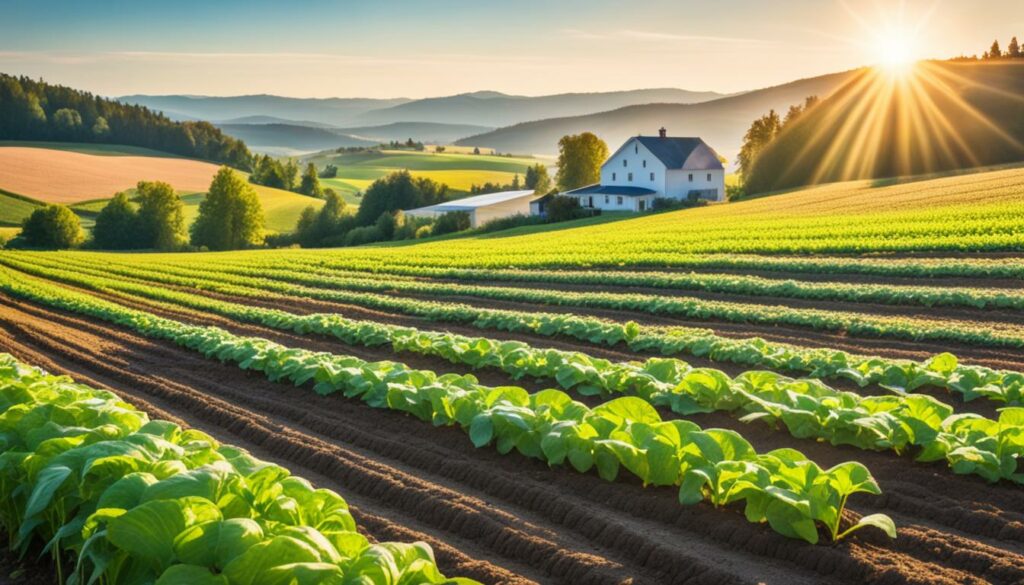
No-till and low-tillage farming save the soil from wearing out. They also cut down on harmful gases in the air. These ways are good for both the earth and the farm’s future.
Managing the soil all year is key to good farming. Cover crops in the winter stop the soil from eroding. They also let water soak in better. Plants like triticale or rye keep the soil healthy.
Some cover crops help the soil keep its nutrients longer. This is better than using artificial fertilisers. These crops are important for farming in a sustainable way.
Windbreaks, made of trees and bushes, reduce how fast the wind blows. They can protect a large area from the wind. The United States has used this method successfully.
Workshops teach farmers to use smart farming methods all year. By using these ways, the land stays strong and fertile in all weather. Farmers learn to work with nature to keep the farm healthy.
Joining soil health education workshops is key for farmers wanting to better their farming methods. These sessions give farmers many tools to keep their soil healthy and improve it.
At these workshops, you’ll find plenty to learn from. This includes new research, blogs, and videos on how to do tasks like the slake test or water infiltration test. These are simple and don’t need special gear.
One fun task is to bury cotton in different soils and see what grows after 4-6 weeks. You can make this happen quicker by dipping the cotton in a sugar solution. The course makes you compare different soils to learn from them effectively.
Alongside learning, there are many chances to meet others in farming. You get to connect with experts and other farmers who share your goals. These gatherings are by places like the University of Minnesota and the MOSH.
They also introduce you to useful tools, like the Midwest Cover Crops Council’s selector tool. This helps you pick the right cover crops for your area. The NRCS in Minnesota links farmers with soil experts, too, for detailed help.
The Sustainable Farming Association sets up hands-on days to help you. Plus, the Soil Health Institute never stops learning and teaching. This part is all about getting real-world and research-based help, making sure farmers get the best advice.
The advanced soil health training is a detailed programme for many. It combines in-person and online educational sessions. This mix means everyone can join in and really learn. It lasts 12-18 months and has four two-day parts in places like the Midwest and New England. Top experts will guide you through the latest in soil health.
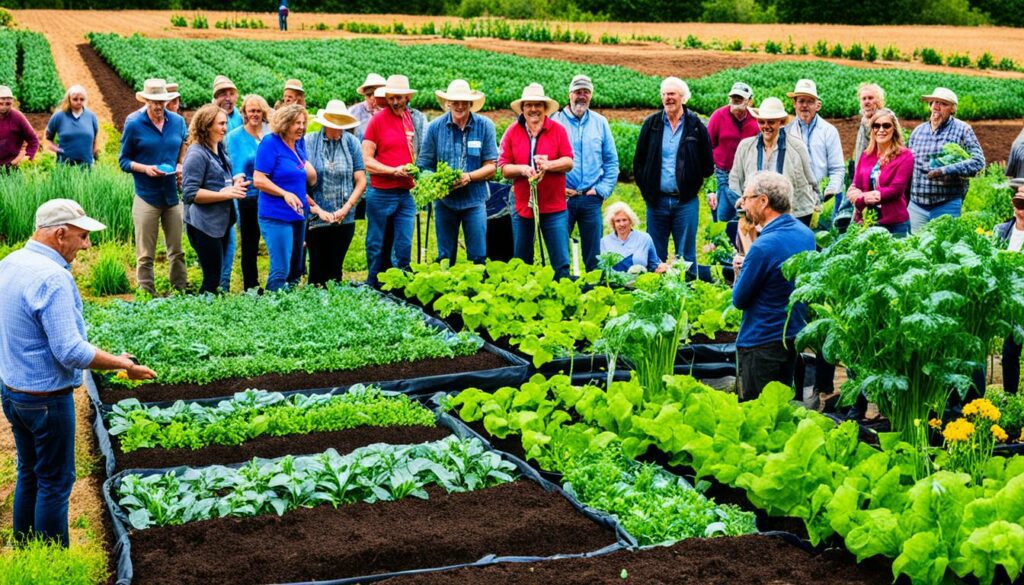
Classes start in summer 2024 for the first group, then again in 2025 for the next. With mix in online sessions, both farmers and ag service providers can study without travel costs. To help, there’s up to $4,000 travel money for each or $1,000 every session.
One big part is getting your hands dirty with practical hands-on experience. You’ll work directly with farmers to use what you learn about soil health. This method shows you the real difference good practices make on the land. There’s an expert group of 30-35 ready to teach about managing soil health and the money side.
If you make a good soil health plan, you might get a bonus of $1,000. After training, you can help teach others too. You might become a go-to advisor for soil health, helping not just farmers but also growing the local knowledge on healthy soil.
When learning about healthy soils, organic soil management stands out. It’s key in soil health workshops. Here, we compare organic and conventional methods. We see how organic ways lead to less pollution and more biodiversity.
Organic soil management is very different from conventional farming. Conventional farming uses man-made ingredients. But, organic farming focuses on natural changes and life processes. It uses crop rotations, picks certain cover crops, and manages nutrients carefully to keep the soil healthy.
Organic soil has nutrients that nature and farmers add. This is vital for keeping crops growing well.
Going organic helps not just the farm, but the whole environment. It stops a lot of pollution by using fewer chemicals. Organic farms help many living things in the soil, like earthworms and good bacteria. These helpers make the soil better and give plants the food they need.
In damp places, the soil can be too acidic. But, organic ways like adding lime make the soil right for plants. Also, the natural balance in organic farms means fewer pests. This keeps the whole area healthy.
A project with NCAT’s Southeast Regional Office and two universities is doing great work. It is training farmers, especially those who grow things organically. They’re using the Canvas platform to get feedback from farmers. This helps them understand soil health better and use this knowledge in their work.
The goal is to make a guide on soil health for the South. This guide will help with the issues farmers face and encourage sustainable farming.
The upcoming soil health assessment workshops dive deep into soil health. You’ll learn how to measure it and improve it. These events were crafted to be hands-on and offer deep insights. They will happen over seven weeks, from October 3 to November 14, 2023. In total, there will be 50 hours of activities to make learning engaging.
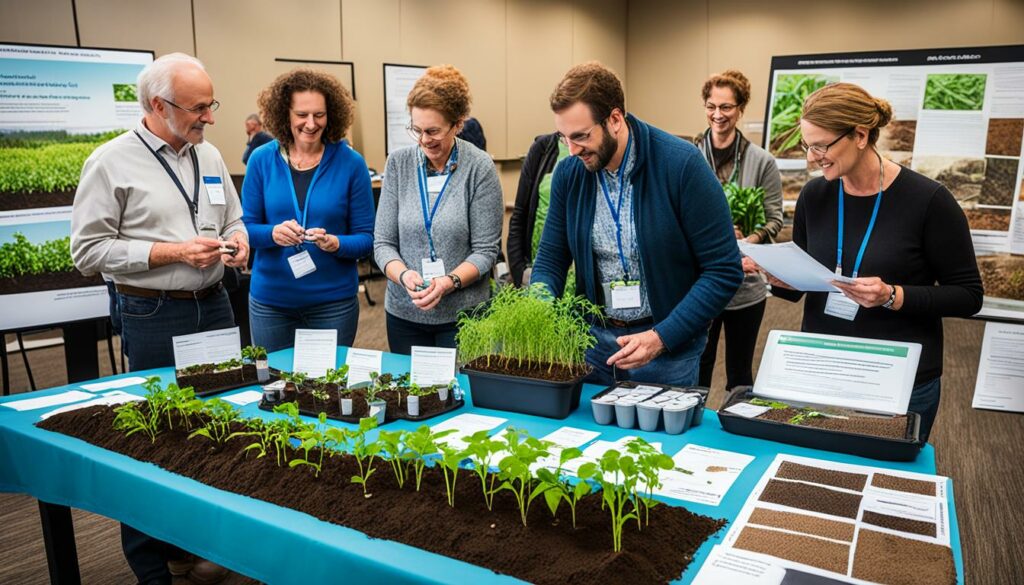
Understanding soil health basics is key for farmers wanting better crops and soil. Workshops will teach about soil’s structure, how much organic matter it has, and the life in it. You’ll use advanced tools to measure these. Then, you’ll make smart choices to better care for your soil. This boosts farm sustainability and how much you grow.
Tuesdays will have live talks from 10:00 am to 12:00 pm EST. You’ll get to talk with experts like Harold van Es and Debbie Aller. These talks aim to make you really understand soil health.
Testing soil correctly is key to these workshops. You’ll get to learn how to test soil to catch problems early. Then, you’ll fix these issues with good management. Plus, there will be Thursday office hours from 10:00 am – 11:00 am EST. This is your chance for one-on-one advice.
The basic course costs $125 to join. But, for $250, you can take both the basic and advanced course. If you’re from a developing country, the cost is $125. And if you live in New York State or are a student, it’s just $75. This makes sure more people can learn how to take care of their soil.
Register now to reserve your spot. These workshops will help you see the big picture of soil health. By the end, you’ll have the tools to make your soil healthier for better food in the future.
Soil biology workshops help us understand the complex world under our feet. Recently, a series of workshops took place in Gatton, Queensland. They looked at how different farming practices affect soil life.
A major focus was on the many types of microbes in soil. Participants learned that the soil is full of life, including various mini-organisms. They saw how harmful farming practices can reduce this life. But, they also saw that life can come back.
They visited the Metagen lab to see how soil testing is done. Here, they also learned about two important tools: SARDI and Metagen, which offer soil biology monitoring.
Organic matter is crucial for healthy soil. The workshops showed how it makes soil better for planting. At Mulgowie Farming Company, people saw these ideas in action. They learned to cover soil, not disturb it, and add organic matter regularly.
Attendees joined hands-on activities like checking soil and planting legumes. These activities were focused on making soils richer. Plus, everyone was urged to use safe biopesticides.
Altogether, these workshops combined knowledge with practical tips. This mix helps people take better care of their soil.
Making soil better helps crops grow stronger and more. At our workshops, we focus on two things. First, we use cover crops a lot. Second, we try to make the soil less packed. By doing these, we change how the soil feels. It becomes better for plants because it holds more water and lets air in easily.
Cover crops are key to making the soil better. Plants like cereal rye, oats, and radish create a cosy, interconnected space in the soil with their roots. Almost all the soil particles can link up this way. It’s found that these links help hold water and air in the soil. Also, these plants can use leftover nitrogen, keeping it in the soil. This makes the soil richer and stops it from going away, keeping the land safe.
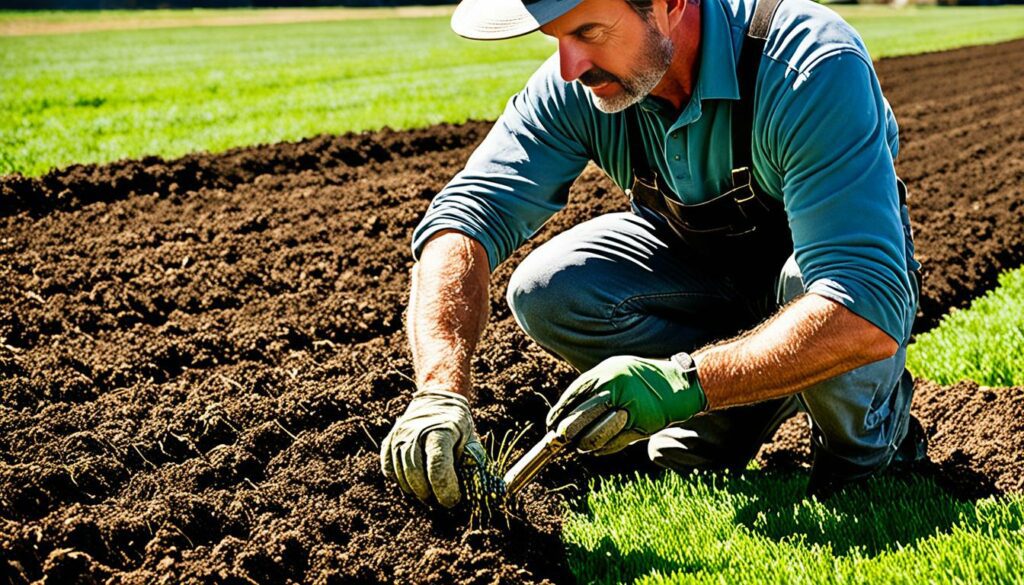
Making the soil less packed is very important too. When soil is too hard, roots grow less, water doesn’t soak in well, and nutrients are harder to get. Doing some things over time, like not tilling the land and using cover crops, can make the soil’s structure better. Adding plants like winter wheat to the mix helps. It makes the soil more varied, which is good for it. Picking the right winter plants is important because they help keep the soil’s nutrients in and let them out at the best times. What’s great is, anyone can learn and do these things, and they don’t need fancy tools.
Using cover crops and fixing soil hardness really make the soil better. We see it in things like how well water goes in, how solid the soil is, and how it uses nutrients. These signs tell us the soil is strong and can help plants bloom all year.
Joining a soil health workshop can really boost your skills. These workshops cover many topics over 12-18 months in various US regions. The focus is on developing expertise in ensuring soil health.
Every workshop hosts 30-35 people for great learning and sharing. This includes both teachers and learners to create an active learning space. We offer two opportunities for learning in 2024 and 2025. This ensures sustained and deep learning for all.
Those who join get a $4,000 travel-payment, given out in $1,000 parts for each training. A special $1,000 helps with planning their soil health projects. This support helps everyone take part, removing financial worries.
The teachings are rich in essential soil health concepts and hands-on methods. These include how to manage cover crops and farm without ploughing. We focus on discussing challenges together and helping each other learn.
Top participants might secure paid jobs as soil experts after training. Our plan aims to involve 20,000 farmers and help them. This includes providing advice, managing data, and aiding with funding for 7,500 farmers. Our goals aim to cut CO2 emissions by 6.9 million metric tons too.
Our goal is also to influence over 7 million acres of land. This shows our big push for both eco-friendly and financially sound practices. By using what we learn here, we hope to heal the earth and support sustainable farming.
The workshop sessions will take place on these dates:
Here’s the cost:
We make sure our events are safe and welcoming for all. You can get a full refund if you can’t make it, but let us know two weeks earlier. Sorry, no pets are allowed, and please stay home if you’re sick. Remember, in Ohio, we’re not responsible for hazards from farm activities.
Maximising profit and making farms stronger are key today. We now focus on lowering costs and improving the land. Noble Land Essentials offers classes to learn how, in places such as Springfield, Missouri, and Ardmore, Oklahoma.
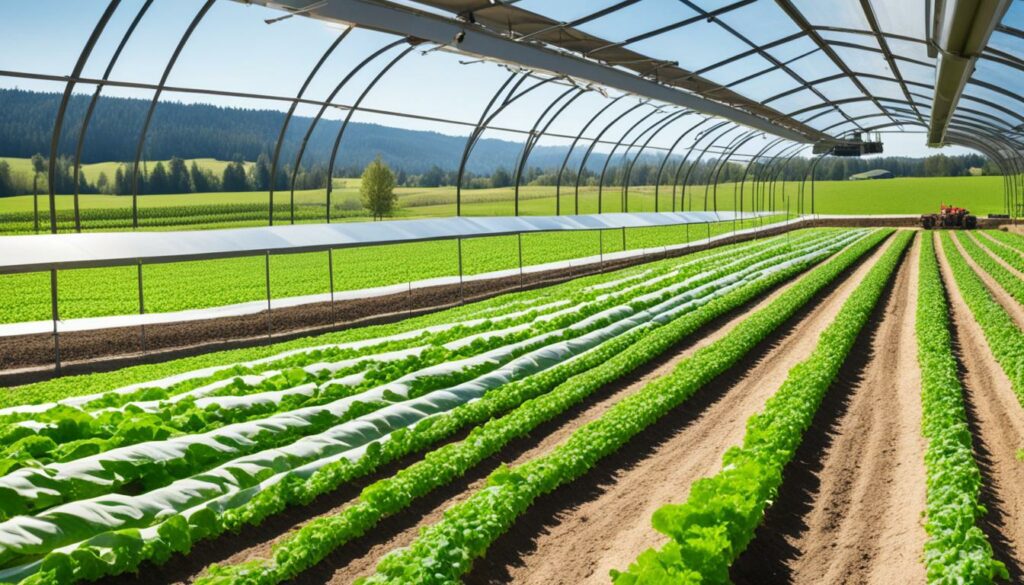
For $395, there’s a two-day class and ongoing virtual sessions. You get help improving soil without spending too much on chemicals.
Lowering costs is crucial. We learn to manage land better, making it more useful for animals and plants. This way, we don’t need to buy as much extra food or other expensive things.
Building up the land’s strength is also taught. We learn methods that boost soil’s quality and its ability to keep water. This makes the land tougher against bad weather and bugs.
People get personal help to understand and improve what they do. This guidance leads to better farming and more money. Financial help from the Inflation Reduction Act of 2022 backs some of these efforts.
Our soil health workshops stand out because they focus on peer-to-peer learning and mentorship in agriculture. This allows participants to learn from farmers who have succeeded in using regenerative practices. The aim is to give farmers both the technical soil knowledge and practical tips they need. This helps them build a network with other knowledgeable farmers.
Our training includes visits to farms that use good soil health practices. This way, participants can see the effects and challenges of these methods themselves. It’s not just about learning theories.
The program also lets farmers try out what they’ve learned in a supportive way. Meetings happen over 12-18 months with four two-day sessions. This includes virtual talks between physical meetings, enhancing the learning experience.
These workshops aim to create a caring network of farmers who help each other and learn together. By joining, farmers get to be part of two training sessions, starting in early spring 2024. There are travel grants and other financial help, such as a $1,000 grant for making a soil health plan.
Selected participants can become soil health advisors and are paid for their help. This way, the program benefits everyone involved and the broader farming community.
But the networking doesn’t stop with the workshops. The relationships and support built here are meant to last, benefiting both individuals and the community. Farmers leave not just with knowledge but also with a group of like-minded peers and mentors dedicated to sustainable farming.
In the world of sustainable farming, soil health workshops are key in teaching and practice. They take place over two days, on January 30-31, 2024. The event will be rich, with morning and afternoon sessions over this time. Nine top experts from around the world will share their knowledge on soil health.
The workshops are backed by big names like the Japanese Society of Soil Science and Plant Nutrition and the International Union of Soil Science. They’re funded by Japan’s Ministry of Agriculture, Forestry, and Fishery. This means there will be talks, discussions, and more on important topics like soil health checkups and how farming affects the earth. The event links up with the International Decade of Soils 2015-2024 and the UN’s goals for 2030. This shows its importance all over the world.
Joining these workshops is a great opportunity for anyone interested. They’re free and packed with useful info and chances to work with others. I hope farmers, researchers, and anyone in farming will take part. It’s a step towards making our farming more sustainable and our land healthier.
Soil health workshops mix classroom study with hands-on work. You’ll hear from top experts in regenerative farming. You’ll also get access to online materials, webinars, and talks each month.
These workshops teach important farming techniques like cover crops and grazing methods. You’ll see how these techniques boost soil fertility and farm growth through real-life examples.
Learning regenerative farming enhances soil and boosts nutrients. It also saves water and helps the ecosystem. All this means healthier, sturdier food.
They teach smart practices that help the soil all year. This way, farms and crops can handle changing weather well.
There’s a lot to access, like blogs, the latest research, and DIY videos. You can also meet and connect with others in the field.
Yes, you can get deeper training online or in person. They include working on farms to really put the training to practice.
The workshops clearly show the benefits of going organic. Like less pollution and more life in the environment.
You’ll learn to test soil health and how to analyse the results. This helps you make choices that make the soil better, so crops grow more and are healthier.
Knowing about soil life and nutrients helps you boost soil health. This is key to making better farming choices.
Cover crops and ways to stop soil getting too hard are a big focus. These make land better for plants to grow and crops to thrive.
Better managing resources means spending less, which boosts how much you make. They also teach ways to make your land strong against bad weather and pests.
Learning from other farmers and supporting each other is really key. It offers continuing advice and teamwork for using green practices.